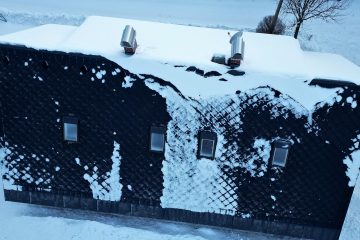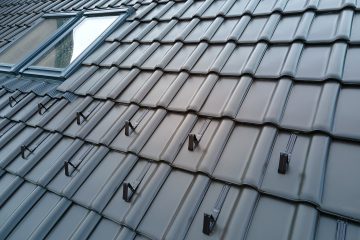Though many people know Arizona for its sweltering, dry heat, the climate can change during the winter months. In the northern mountainous parts of the state, winter consists of below-freezing temperatures at night and moderate snowfall.
Having the right roof on your home is essential for maintaining enough warmth during the winter. For many residents, the debate is over a metal roof vs. shingles in a cold climate because they are the most common roofing materials. Here is a helpful guide to aid you in your decision.
Metal Roof Qualities

Metal roofs come in various styles, textures, and colors. Some of the most common metals for roof construction include steel, aluminum, zinc, copper, and stainless steel. Residences in agricultural locations tend to have more metal roofs than urban areas.
Some of the benefits of metal roofs include:
- Durability
- Fire resistance
- Recyclability
- Low maintenance
Asphalt Shingle Roof Qualities

Asphalt shingles come in two styles: organic and fiberglass. Organic shingles have a thick layer of felt under the asphalt for waterproofing. However, fiberglass replaces the felt in modern asphalt shingles, which are thinner and easier to carry.
The popularity of asphalt shingles is primarily due to their attractive appearance. They are a reliable material that many roofing contractors like to work with, and they complement many architectural styles. Other asphalt shingle benefits include:
- Wide color variety
- Simple installation
- Inexpensive
- Moderate fire resistance
Metal Roof vs. Shingles in a Cold Climate
Metal Roofs
Because of their design and composition, metal roofs tend to be more durable than asphalt shingles. Property owners can easily remove snow from the roof without worrying about the material absorbing moisture. Metal roofing is so durable that homeowners can schedule an installation during the winter because it’s not as vulnerable to snow and ice damage as asphalt.
Metal roof surfaces are non-absorbent. Snow and water will easily slide off the roof instead of accruing heavy accumulations. The lack of water accumulation and watertight assemblies ensure that metal roofing will have a low risk of developing a leak.
Metal acts as an insulator—it’s possible to retain warmth inside the house instead of allowing it to seep out. With this roofing material, homeowners can use less energy to heat their homes, resulting in a drop in energy costs. Even in cold weather, the surface of a metal roof will remain warmer than the temperature outdoors.
Asphalt Shingles
Asphalt shingles are a worthwhile option for homeowners who need a new installation or roof replacement at a low cost. As one of the most popular roofing materials in the country, asphalt shingles are generally inexpensive to purchase and install.
Ideally, homeowners shouldn’t schedule asphalt shingle roof installation during the winter months. The material has an adhesive backing that relies on the sun’s heat and warmth to bond it to the roofing underlayment.
Some manufacturers design their asphalt shingles to perform well in all weather conditions, including winter weather. Unfortunately, this does not lend to the material’s longevity. Traditional shingles tend to wear down faster in harsh weather conditions.
The material can absorb water from rain, ice, and snow, increasing the risk of leaks into the home. Shingles are also prone to fall away under heavy winds or snowfall.
On the positive side, asphalt does provide some energy-efficiency for residential properties. Some manufacturers formulate the material to have additional solar heating properties to retain heat.
Turn To the Metal Roofing Professionals in Flagstaff, AZ
After considering a metal roof vs. shingles in a cold climate, turn to Polaris Roofing Systems for your roof installation or replacement. As the leading roofing company in Flagstaff, AZ, our team offers unparalleled roofing installations using various materials, including metal, shingles, and more. Contact our team at (928) 699-4840 and request your free quote.


